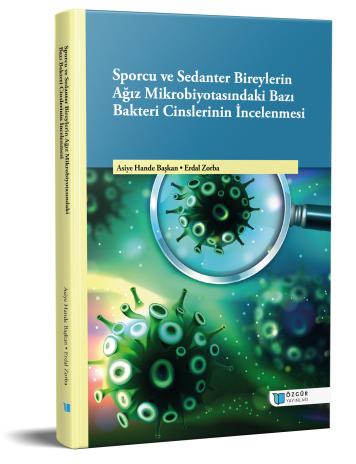
Sporcu ve Sedanter Bireylerin Ağız Mikrobiyotasındaki Bazı Bakteri Cinslerinin İncelenmesi
İndir
Özet
Bu çalışmanın amacı, sporcu ve sedanter bireylerin ağız mikrobiyotasındaki bazı bakteri cinslerini incelemektir. Çalışmaya yaşları 18-24 arasında 15 erkek gönüllü katılarak 3 gruba ayrılmıştır. Birinci grupta profesyonel ligde futbol oynayan erkek sporcular (n=5), ikinci grupta amatör ligde futbol oynayan erkek sporcular (n=5) ve üçüncü grupta herhangi bir fiziksel aktiviteye katılmayan (sedanter) erkeklerden (n=5) oluşmuştur. Gruplara ölçüm öncesinde çalışma hakkında bilgi verilmiş, bilgilendirilmiş gönüllü olur formu ve demografik bilgi formu uygulanmıştır. Katılımcıların ağız mikrobiyota ölçümleri için ağız sürüntü örneği alınmıştır. Alınan örnekler Yeni Nesil Dizileme (NGS) yöntemi ile Illumina MiSeq analiz cihazı kullanılarak, Mikrobiyoloji ve Mikrobiyota Analiz Laboratuvarında biyoinformatik analizleri yapılmıştır. Verilerin analizinde SPSS 24 paket programı kullanılarak, anlamlılık düzeyi p<0.05 olarak alınmıştır. Ayrıca elde edilen mikrobiyal komünite profilleri Minitab 17 yazılımı kullanılarak birbirleriyle karşılaştırılmış ve dendrogramlar oluşturulmuştur. Grupların ağız mikrobiyota analizlerinde, ağız boşluğunda baskın bakteri cinslerinden Prevotella, Lachnospiraceae, Haemophilus, Leptotrichia ve Streptococcus cinsi bakteriler bulunmuştur. Lachnospiraceae ve Streptococcus cins bakterileri, sporcu gruplarda (profesyonel ve amatör futbolcu) sedanterlere göre daha yüksek bulunup, gruplar arasında istatistiksel olarak anlamlı farklılık tespit edilmiştir (p<0.05). Ayrıca sporcu grupların Prevotella ve Leptotrichia cinsi bakterileri sedanter bireylere göre daha düşük, profesyonel futbolcuların Haemophilus cins bakterisi diğer gruplara göre daha yüksek çıkmasına rağmen istatistiksel olarak anlamlı fark olmadığı bulunmuştur (p>0.05). Sonuç olarak; profesyonel ve amatör düzeyde yapılan futbol antrenmanlarının, sporcuların ağız mikrobiyotasında bulunan önemli bakteri cinslerini etkileyebileceği söylenebilir. Özellikle diş çürüğünde ve infektif endokarditte önemli rol oynayan Streptococcus cins bakterisinin profesyonel grupta daha fazla olması, yapılan yoğun antrenmanların ağız mikrobiyotasını bozabileceği ile ilgili olabilir. Sonuçlarda sporcu grupların ağız mikrobiyotası kötü ağız sağlığı ile ilişkilendirilmiştir. Sporcu ve sedanter gruplarının arasında ağız mikrobiyotadaki bakterilerin taksonomik bir seviyede incelenmesi ile ilgili konunun ilk ilişkisini kurarak özgü bir çalışma olmuştur.

